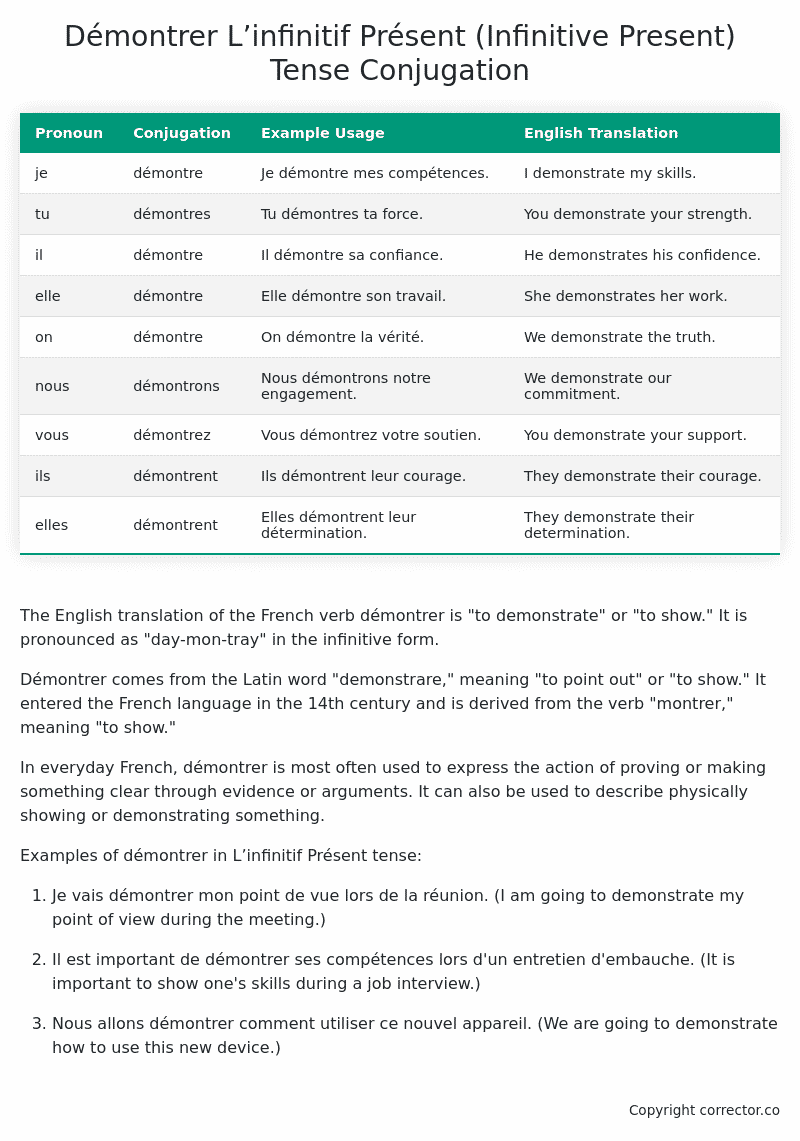L’infinitif Présent (Infinitive Present) Tense Conjugation of the French Verb démontrer
Introduction to the verb démontrer
The English translation of the French verb démontrer is “to demonstrate” or “to show.” It is pronounced as “day-mon-tray” in the infinitive form.
Démontrer comes from the Latin word “demonstrare,” meaning “to point out” or “to show.” It entered the French language in the 14th century and is derived from the verb “montrer,” meaning “to show.”
In everyday French, démontrer is most often used to express the action of proving or making something clear through evidence or arguments. It can also be used to describe physically showing or demonstrating something.
Examples of démontrer in L’infinitif Présent tense:
-
Je vais démontrer mon point de vue lors de la réunion. (I am going to demonstrate my point of view during the meeting.)
-
Il est important de démontrer ses compétences lors d’un entretien d’embauche. (It is important to show one’s skills during a job interview.)
-
Nous allons démontrer comment utiliser ce nouvel appareil. (We are going to demonstrate how to use this new device.)
Table of the L’infinitif Présent (Infinitive Present) Tense Conjugation of démontrer
| Pronoun | Conjugation | Example Usage | English Translation |
|---|---|---|---|
| je | démontre | Je démontre mes compétences. | I demonstrate my skills. |
| tu | démontres | Tu démontres ta force. | You demonstrate your strength. |
| il | démontre | Il démontre sa confiance. | He demonstrates his confidence. |
| elle | démontre | Elle démontre son travail. | She demonstrates her work. |
| on | démontre | On démontre la vérité. | We demonstrate the truth. |
| nous | démontrons | Nous démontrons notre engagement. | We demonstrate our commitment. |
| vous | démontrez | Vous démontrez votre soutien. | You demonstrate your support. |
| ils | démontrent | Ils démontrent leur courage. | They demonstrate their courage. |
| elles | démontrent | Elles démontrent leur détermination. | They demonstrate their determination. |
Other Conjugations for Démontrer.
Le Present (Present Tense) Conjugation of the French Verb démontrer
Imparfait (Imperfect) Tense Conjugation of the French Verb démontrer
Passé Simple (Simple Past) Tense Conjugation of the French Verb démontrer
Passé Composé (Present Perfect) Tense Conjugation of the French Verb démontrer
Futur Simple (Simple Future) Tense Conjugation of the French Verb démontrer
Futur Proche (Near Future) Tense Conjugation of the French Verb démontrer
Plus-que-parfait (Pluperfect) Tense Conjugation of the French Verb démontrer
Passé Antérieur (Past Anterior) Tense Conjugation of the French Verb démontrer
Futur Antérieur (Future Anterior) Tense Conjugation of the French Verb démontrer
Subjonctif Présent (Subjunctive Present) Tense Conjugation of the French Verb démontrer
Subjonctif Passé (Subjunctive Past) Tense Conjugation of the French Verb démontrer
Subjonctif Imparfait (Subjunctive Imperfect) Tense Conjugation of the French Verb démontrer
Subjonctif Plus-que-parfait (Subjunctive Pluperfect) Tense Conjugation of the French Verb démontrer
Conditionnel Présent (Conditional Present) Tense Conjugation of the French Verb démontrer
Conditionnel Passé (Conditional Past) Tense Conjugation of the French Verb démontrer
L’impératif Présent (Imperative Present) Tense Conjugation of the French Verb démontrer
L’infinitif Présent (Infinitive Present) Tense Conjugation of the French Verb démontrer (this article)
Struggling with French verbs or the language in general? Why not use our free French Grammar Checker – no registration required!
Get a FREE Download Study Sheet of this Conjugation 🔥
Simply right click the image below, click “save image” and get your free reference for the démontrer L’infinitif Présent tense conjugation!

Démontrer – About the French L’infinitif Présent (Infinitive Present) Tense
Forming the Infinitive Present
Common Everyday Usage Patterns
As a Verb’s Dictionary Form
After Modal Verbs
As an Imperative
In Infinitive Clauses
Interactions with Other Tenses
Present Tense
Future Tense
Conditional Tense
Passé Composé
Imperfect Tense
Subjunctive and Conditional Moods
Summary
Want More?
I hope you enjoyed this article on the verb démontrer. Still in a learning mood? Check out another TOTALLY random French verb conjugation!


